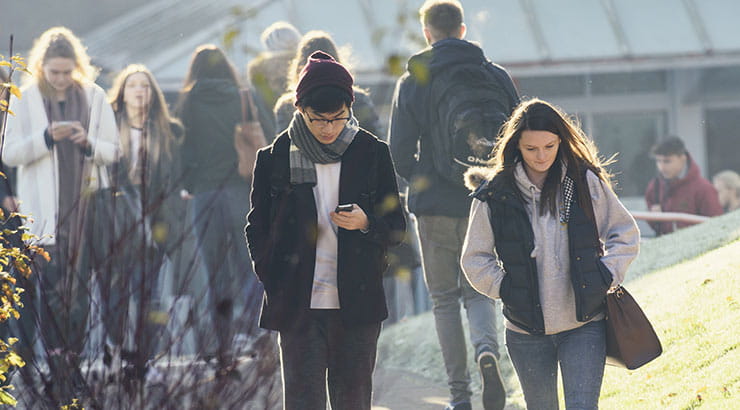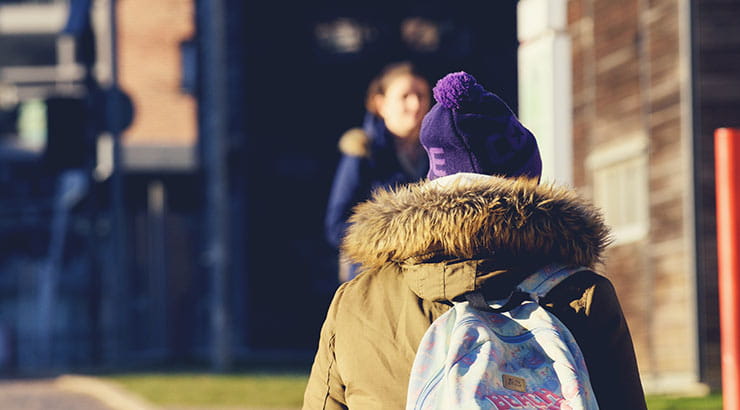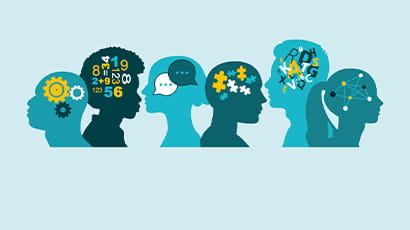Disability support guide
Everything you need to know about accessing our Disability Service as a new or current student.
How to use this guide
This guide will help you to understand what support our Disability Service can offer you during your studies and how to access it.
We know that not everyone who accesses our services thinks of themselves as disabled, but we use the term because it is used in the Equality Act. In the Equality Act, a disability means a physical or a mental condition which has a substantial and long-term impact on your ability to do normal day-to-day activities.
You are covered by the Equality Act if you have a progressive condition such as HIV, cancer or multiple sclerosis, even if you are currently able to carry out normal day-to-day activities.
Who we support
We support students with a range of conditions, including (but not limited to):
- specific learning differences (SpLDs) such as dyslexia and dyspraxia
- autism
- neurodiversity
- D/deaf, hard of hearing
- visual impairment
- mental health conditions
- mobility impairment
- long-term health conditions such as epilepsy or chronic fatigue syndrome.
"The Disability Service have helped me since my very first day at University. They were easy to get in touch with and it was safe space without any judgement and prejudice – without their help in organising things such as extensions, I would not have achieved First Class Honours in my degree."
"What I enjoy most about UWE Bristol is the positive and supportive atmosphere created by everyone, from the disability advisers to the academic staff. This makes me feel included and welcome."
Disclose as disabled
We encourage all applicants and students to disclose any disability and support needs they might have. Without this information, we are unable to offer you appropriate information, guidance and support during your studies.

Applicants
When you apply to UWE Bristol, you will have the opportunity to disclose a disability or support need in your UCAS application. You are strongly encouraged to disclose in your application so that we can make sure you have support in place before you start your course.
Disclose in your application
Current students
If you are a current student, you can disclose a disability or support need at any time using our enquiry form. We will ask you to submit evidence to us so that we can identify what reasonable adjustments are needed to support you.
Disclose using our enquiry formHow we can support you
Reasonable adjustments
We can make reasonable adjustments to help reduce the impact of a disability or medical condition that puts you at a substantial disadvantage in your learning, teaching or assessment situation.
For example, we can make adjustments to assessments such as extra time, use of a computer or alternative assessment.
We are happy to talk with you about your reasonable adjustments, which can change as you go through your course.
Please contact us using our enquiry form (Infohub login required) in the first instance.
Study support
The support and equipment you will receive is normally decided through your Study Needs Assessment when you apply for Disabled Students' Allowances (DSA). Depending on your support needs, you may be offered:
- access to our dedicated Support Worker Service
- specialist mentoring support and specialist study support
- assistance with travel to the University
- radio aids or portable loop systems
- alternative formats of library books and course materials and provision of assistive technology
- exam adjustments such as scribes, readers or prompts.
If you need support and you are not eligible for DSAs please get in touch with us using our enquiry form (Infohub login required).
Disability support checklist
There are some things you can do to make sure you get the support you need.

Apply for DSA funding
We strongly recommend that you apply for funding if you are eligible. DSA funding may cover things like one-to-one study skills tuition, one-to-one mentoring and assistive technology.

Send evidence to us
When you apply for support with us, please provide us with evidence of your disability or medical condition so we can offer you the right support. If you don't have evidence, we may still be able to help.

Check reasonable adjustments on MYUWE
You can login to MYUWE to see your reasonable adjustments at any time in your ‘Your info’ section.

Create an impact statement
An impact statement is a short paragraph about your support needs that is shared with your teaching team, so that they can better understand how to support you.
Studying with us
Choosing a course
You can get advice on choosing a course from the careers and employability service. They can offer guidance about which courses might suit you and what career paths they will lead on to.
If your impairment means that you are likely to have frequent problems attending, part-time study may suit you better than full time.
It may be possible to switch between full-time and part-time study for different years of your award. You can discuss this possibility by booking an appointment with a Student Support Adviser. It is often better to take a longer period of time to complete your award by studying part time than it is to remain on a full-time course.
Placements
Some courses at the University involve compulsory placements. If yours does, this may mean you need specific arrangements or support whilst on a placement. If you have a health and education placement then you should talk initially to your tutor about whether an access plan for placements meeting is required.
You should first contact Disability Service or the Placements Team to discuss your needs.
Accessible accommodation at Frenchay Campus
The University has residential accommodation on Frenchay Campus which has been adapted for disabled students. All rooms within the Student Village are wheelchair accessible. Rooms with a visual fire alarm and socket for vibrating pad alarm are also available if you are D/deaf or hard of hearing.
If you are insulin dependent you can be provided with a separate fridge in your university accommodation to keep your medication.
Additional adaptations may be made on an individual basis, subject to resources. Disabled students who make UWE Bristol their first choice when applying for courses are given priority when allocating rooms.
If you need adaptations or other adjustments to your UWE Bristol accommodation, please let Accommodation Services know as soon as possible.
Campus accessibility
Frenchay Campus has many accessible features, including lifts to different levels, automatic doors and clearly marked accessible routes. Other UWE Bristol campuses are also accessible; however, due to the age of the buildings, there may be some minor navigational issues.
We encourage you to visit the campus where your course will be based, as this should help you judge whether you will need some orientation support or further adjustments such as to timetabling.
Parking
All campuses also have wide, disabled bays and the University operates an accessible parking permit scheme. To find out more about accessible parking and to obtain car parking permits, please visit the accessible parking page.
Emergency evacuation
While on University premises, you must be able to leave buildings safely in the event of a fire or other emergency.
If you cannot evacuate yourself in an emergency situation and need help to make a safe exit, or if you want to know how your evacuation would work, please contact your Programme Leader. They can set up a personal emergency evacuation plan (PEEP) with you that is tailored to your needs.
Transfer your healthcare or personal support
Independent living support
If you have assistance to support your independent living at home, or think you may need this type of support when you move to university, please contact your local authority's Social Services department well in advance of starting your course. Remember that you'll need to transfer any health services that you currently use or request a social care assessment if you think you may require support when living away from home.
NHS mental health services
If you are accessing support from NHS mental health services, we would recommend that you talk to your care coordinator or consultant about referral to local NHS services if they feel that you need to continue receiving support while at university. We would recommend that these referrals/transfers of care take place before you arrive at university to make sure that you avoid a gap in support. We would also recommend that you register with a local GP as soon as you arrive.
External providers
If you are accessing support from an external provider such Guide Dogs for the Blind, or RNIB sighted guide support, UWE Bristol can work with you to integrate this support.
Please note: The Disabled Students’ Allowances do not fund support that is directly medical or personal-care related. This continues to be provided by health or social services departments.
Bringing assistance animals to campus
If you have an assistance animal that you are considering bringing to UWE Bristol, please use the Disability Service online enquiry form to talk to us about this.
Useful resources
You may also find the following websites helpful:
There is also information about what else you might want to consider on the AdvanceHE website.
You may also be interested in

Wellbeing Service
Our wellbeing practitioners are here to support your mental health and personal development needs.

Get wellbeing support
Get instant wellbeing support with the Wisdom app.

Neurodivergence and mental health study support
The Access and Learning Strategies (ALS) team offers advice and support for students who need help in identifying and diagnosing SpLDs.

Assistive technology
Information on the assistive technologies that UWE Bristol provides for disabled students.
